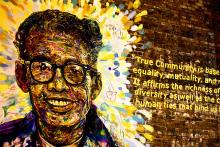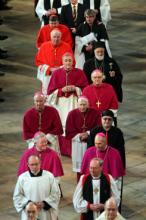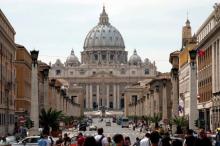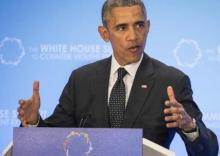Faith and Politics

The life and legacy of Pauli Murray has been getting a lot of attention from the media lately. Articles on Salonand NPR have highlighted Murray’s trailblazing legal work around the intersections of race and gender in America. Murray’s scholarship and activism around ‘Jane Crow’ — the overlapping discrimination faced by women of color — arose from her own experience as an African-American woman in early 20th century and her arguments resonate with seemingly even greater force today.
Less talked about, but equally needed in our present time, is an examination of her work as a priest and a theologian — and, critically, how her understanding of religious and nonreligious concepts provided the means, methods, and motivation for her own activism.
Indeed, in a life filled with accomplishments, it was perhaps her final achievement that she prized most personally. In 1973, Murray became the first female African-American Episcopal priest.
A lifelong Episcopalian, Murray’s faith had always fueled her work for racial and gender equality. A small example from her experience at the famous 1963 March on Washington exemplifies this commitment. In typical Murray fashion, she attended with two groups that she felt represented her commitment to civil rights. Marching first with the local American Civil Liberties Union chapter, she then veered off and found the delegation from St. Mark’s-in-the-Bowery parish, her home church in New York, to watch the “oncoming multitudes” peacefully demand racial equality in an unequal country.

Our Lady of Vilnius Church, built by families of immigrant Lithuanian longshoremen, started out a century ago as a beloved worship space. Now, it’s a coveted real estate asset.
In 2013, six years after the church was closed, it was sold for $13 million to one of the city’s biggest developers. The following year, that company flipped it like a pancake to another developer for $18.4 million.
Now the yellow brick church near the entrance to the Holland Tunnel awaits demolition to make way for an 18-story luxury apartment house.
“It makes you cynical,” says Christina Nakraseive, a former parishioner who supported the legal case against the church closing until it was rejected by the state’s highest court. “It seems like it’s all about real estate.”
The issue has taken on added significance since the Roman Catholic Archdiocese of New York, citing declining attendance, rising costs, and a looming priest shortage, announced plans to merge scores of parishes and close dozens of churches this year.

A recent survey found that 57 percent of Republicans agreed that Christianity should be established as the United States’ national religion.
Not only would this violate the clear wording of the Constitution and the intention of the founders to keep religion and government separate, it also raises a difficult quandary.
Whose Christianity?
Of the estimated 1,500-plus Christian denominations in the U.S., which flavor of Christianity would emerge as the national standard?
Would it be conservative Christianity or liberal Christianity? Would it be Roman Catholic, Protestant, Orthodox, or nondenominational? Would it be church-centered Christianity or a more personal flavor, such as house communion? Would it be the 1950s-style neighborhood-church Christianity that many older churchgoers yearn for, or a contemporary megachurch?

An Atlanta woman’s scheduled execution was given an 11th-hour delay yet again — this time by the Department of Corrections late Monday evening.
Kelly Gissendaner, convicted in 1998 of conspiring to and abetting in murder of her then-husband, Doug, faced execution at 7 p.m. EST on Monday. Her original execution — scheduled for the evening of Feb. 25 — was delayed due to weather. After several appeals for clemency were denied by the Georgia Board of Pardons and Paroles and the Georgia Supreme Court, Gissendaner’s lawyers petitioned the Supreme Court to hear her appeal and to issue a stay in the meantime.
Though there has yet been no word from the Supreme Court, the request for delay was honored — at least in part. According to CNN, the execution is on hold due to the cloudy appearence of the drugs prepared for the execution.

Southern Baptist Convention President Ronnie Floyd and former leaders of the nation’s largest Protestant denomination on March 2 called on President Obama to defend “the least of these” against the Islamic State, the militant Islamist group that’s also known as ISIS or ISIL.
“Since ISIS is a continuing threat to world peace in a way unknown to us since the Nazis of World War II, we humbly call upon you to use the influence and power of your distinguished office to take the necessary actions now in this urgent hour to bring an end to these human atrocities,” wrote Floyd and his predecessors in an open letter to Obama.
“The abuse, brutalization, and murder of children, women, and men that is occurring before the world calls our country to lead forward to bring this to an end.”
Floyd, pastor of Cross Church in northwest Arkansas, was joined by 16 former presidents in the “urgent appeal” that came after recent reports that the Islamic State was responsible for the beheadings of 21 Egyptian Coptic Christians in Libya and the kidnapping of more than 200 Assyrian Christians.
The letter also was released just before the Jewish holiday of Purim, which recalls the deliverance of Persian Jews by Queen Esther. The Baptist leaders told Obama he had a similar mandate to save an imperiled population from extinction.

Georgia clergy just delivered 500 signatures of faith leaders and 40 boxes of names from around the world — calling for a stop to tonight’s execution of Kelly Gissendaner. And there are more than 55,000 folks on the Groundswell petition that launched just yesterday, and more than 1,000 new names are coming in every hour.
But some suggest it is like speaking into thin air — that there is no chance the governor or the Georgia Board of Pardons and Parole will listen. After all, Georgia has already executed two people this year, more than any state other than Texas.
But there’s a Georgia case that would suggest otherwise, that all this may not be in vain — that of Billy Moore.
After 17 years on death row for a murder he openly confessed to doing, Billy Moore’s execution was stopped — by a groundswell of support from faith leaders (including Mother Teresa), people of conscience, and even the victim’s family. And it was the Georgia Board of Pardons and Parole that stopped his imminent execution. In fact, they eventually decided his rehabilitation was so complete and compelling that he was eligible for parole a year later.
So thousands of Georgia citizens and folks around the world are hopeful. Tonight there is an opportunity — not to be “soft on crime” or to ignore wrongdoing, but to bear witness that redemption is possible. Tonight Georgia leaders have a chance to recognize that people can be healed, rehabilitated, restored — and that they do not have to be forever held hostage and defined by the worst decision they made.

It is a great and terrible irony that our country’s correctional system does not often allow for or take much pride in perpetrators’ self-correction.
Yet to the degree that transformation within the system is possible, such appears to have happened for Kelly Gissendaner. The 46-year-old woman was sentenced to death for the 1998 murder of her then-husband, Doug. It is well-documented that her accomplice and then-boyfriend committed the act — he is sentenced to life, with a chance at parol.
Gissendaner faces excecution tonight at 7 p.m. EST.
If carried through, it will be the first time since 1976 that the state of Georgia will execute an individual who was not the person physically using violence in the crime.
Gissendaner’s case — that of a person guilty of murder whose profound internal transformation while in prison has led to a contemplative life of studying theology, mentoring at-risk youth, offering pastoral care to fellow inmates, and expressing full and sincere remorse for her actions — calls into stark question whether our criminal justice system, and specifically the state's use of the death penalty, honestly allows for the possibility for redemption.

I’m cringing as I write this.
That tells you a lot about me. When it comes to politics and theology, I identify as liberal. I firmly believe that Jesus wanted everyone fed, wanted universal health care, and that the Kingdom of God is about politics. It’s about structuring our personal and communal lives in a nonviolent way that ensures everyone has food to eat, debts are forgiven, and healing is freely provided for everyone.
Bill O’Reilly symbolizes almost everything that I loathe about American Christianity. His hyper-conservative politics is reinforced by his hyper-conservative theology. Many of my family members love his show, but I cringe when I hear his voice.

The phenomenon of “creeping normality” allows for significant changes to be deemed acceptable when they occur gradually over time, in relatively unnoticed increments, rather than single steps or dramatic and noticeable instances. The “boiling frog” metaphor, which illustrates the familiar account of an unassuming amphibian that is slowly and successfully cooked to death, reveals not only how such instances can occur, but also how a calculated and protracted alteration (produced by those with power to turn up the heat) can possess disastrous results if not noticed and properly countered (by those left in the water). We need not look far for modern-day examples.
Extreme partisanship has crept into our political normality. As revealed last year by the Pew Research Center, our civic temperature is methodically rising, perhaps beyond the boiling point. The study states:
“The overall share of Americans who express consistently conservative or consistently liberal opinions has doubled over the past two decades from 10% to 21%. [As a result], the center has gotten smaller: 39% of Americans currently take a roughly equal number of liberal and conservative positions, down from 49% in surveys conducted in 1994 and 2004.”

Throughout my past eight years of engaging in social justice, I’ve been drawn to people who have uncanny ideas. Ideas that peace and unity can exist. Dreams that Heaven can indeed be experienced on this planet. People who are unafraid to raise hell and create peace in every single breath.
But often times, in these circles, a buzz phrase kept coming up: “Being a voice for the voiceless.”
This phrase is used in many circles, from large Christian NGOs to CNN. It likely means something different to each person. When it comes from voices in the faith community, it’s often rooted in the words of the prophet Isaiah: “Speak out on behalf of those who have no voice, and defend all those who have been passed over." (Proverbs 3:18).
While I never believed in being a voice for the voiceless, I’ve had my fair share of ethnocentrism. As I boarded a plane for South Africa in 2007 on a service learning trip, I asked the white woman sitting in front of me what she’d be doing in Africa, as though everyone on the plane was going for a visit like me.
“I live there,” she replied, flatly.

The Church of England was accused of double standards on Feb. 23 for offering jobs in cathedrals at lower wages than those it has called on other British employers to pay their workers.
Under the banner headline “Wages of Sin,” the Sun reported that it had found several advertisements for jobs in cathedrals that offered pay well below the “living wage” of 7.85 pounds ($12) an hour, endorsed by the Church and senior politicians.
Archbishop of Canterbury, Justin Welby, said the Church recognized that no employer could ramp up wages overnight, and was working hard to get to a point where it was paying all of its workers the living wage.
“It’s embarrassing. We’d prefer to be there. We’re getting there as quickly as we can,” Welby, the spiritual head of the 80-million strong Anglican communion, told the BBC.
“It’s not the only area where we fall short of our own standards. We work on it as hard as we can,” he said.

How tough is it to create a racially diverse denomination? Consider a recent luncheon organized by the Southern Baptist Convention, the nation’s largest Protestant denomination.
About 100 Nashville-area evangelical leaders accepted invitations to a lunch hosted by the denomination’s policy arm, the Ethics & Religious Liberty Commission. On the agenda: a pitch for a spring summit and a short discussion by ERLC President Russell Moore about the need for churches to become more racially diverse.
The number of African-Americans who showed up for the lunch? Four (two of them denomination employees).
ERLC leaders originally planned a summit on bioethics. They quickly shifted gears after grand juries in November and December failed to indict police officers for the deaths of young unarmed black men. Moore’s social media remarks condemning the New York City jury’s decision not to indict the officer who killed Eric Garner were met with an angry backlash, some from people filling Southern Baptist pews and pulpits.
Black church leaders are greeting news of the summit with reactions ranging from polite skepticism to hopeful support.


San Francisco Archbishop Salvatore Cordileone has rejected criticism from state lawmakers over the use of morality clauses for Catholic schoolteachers, asking whether they would “hire a campaign manager who advocates policies contrary to those you stand for?”
The archdiocese sparked protests earlier this month when it unveiled morality clauses for four Catholic high school handbooks as well as for teacher labor contracts.
The handbooks single out church teaching against homosexual relations, same-sex marriage, abortion, artificial birth control and “reproductive technology,” women’s ordination, pornography, masturbation and human cloning, according to the National Catholic Reporter.
The language says that “administrators, faculty, and staff of any faith or no faith are expected to arrange and conduct their lives so as not to visibly contradict, undermine or deny” church doctrine and practice on those topics.
Five members of the state Assembly and three state senators sent Cordileone a letter urging him to remove the clauses, which they said were discriminatory and divisive.

The Italian government is on high alert after threats from the Islamic State called Italy “the nation signed with the blood of the cross.”
Italy is one of a handful of major Western counties that has not been victim of a large-scale terror assault since the Sept. 11 attacks in the U.S.
Italian officials fear extremists could enter the country amid the growing tide of refugees arriving by boat from North Africa. About 500 extra troops have been stationed to guard symbolic targets in Rome and monitor the streets of the capital for suspicious activity.
The video threat, released with images of 21 Coptic Christians from Egypt who were beheaded this month, warned that Islamic State forces were “south of Rome,” in Libya. At its closest point, Libya is little more than 100 miles from the Italian islands of Sicily and Sardinia.
This comes four months after the Islamic State’s propaganda magazine Dabiq ran a cover photo of the militant group’s flag flying above the obelisk in St. Peter’s Square in the Vatican with the headline: “The failed crusade.”

What do you want to pass on to your grandchildren? What will you give to future generations?
There’s a special spot on my shelf for books my grandparents handed down to me over the years. I cherish the collection of love poetry my grandfather gave my grandmother for a wedding anniversary decades ago. I treasure my grandfather’s old prayer book and hymnal. Depending on your family history, most of us will have at least a few old treasures from generations before.
Some things pass from one generation to another with special care—a family wedding ring, a chess set from the home country, old pictures. Other items, however, pass with less care and planning. My wife, for instance, has her grandmother’s old cookie jar. It’s made of cheap, simple glass and is completely unremarkable except for the memories of cookies eaten at grandma’s house it evokes.
Families aren’t the only ones thinking of passing things along. Politicians, skilled at tugging heartstrings, speak often of “future generations.”

President Obama said Feb. 19 that governments across the globe are obligated to confront the “warped ideologies” that lead to terrorism, “especially their attempt to use Islam to justify their violence.”
National leaders must also dispute claims that there is a clash of civilizations in the world, the president said during a second-day speech at the White House Summit on Confronting Violent Extremism.
“The notion that the West is at war with Islam is an ugly lie,” Obama said. “And all of us, regardless of our faith, have a responsibility to reject it.”
Obama also addressed summit delegates on Feb. 18 in a session devoted to discussing how local communities can help dissuade young people from following the path of violent extremism.
1. Because Extreme Cold Always Brings Climate Deniers Out of the Woodwork …
Bill Nye, yep, the Science Guy, offers the media this helpful prompting: “‘Let’s not confuse or interchange climate change with global warming,’ noting that when the climate changes, ‘some places get colder.’”
2. After the Copenhagen Synagogue Shooting, This Muslim Community Is Responding in the Best Way Possible
“Islam is about protecting our brothers and sisters, regardless of which religion they belong to. Islam is about rising above hate and never sinking to the same level as the haters. Islam is about defending each other. Muslims want to show that we deeply deplore all types of hatred of Jews, and that we are there to support them.”
3. Afghan Civilian Deaths Hit Record High
2014 was the deadliest year on record for civilians in Afghanistan, according to the U.N. Total civilian casualties jumped 22 percent from 2013.
4. Ash Wednesday: To Be Seen
“… revelation does happen and ... we see. We see that we have always been seen by God. God holds us and beholds us even when it can be so hard for us to hold and behold God.”

Ash Wednesday begins Lent, a 40-day season in the church’s life leading up to the death and resurrection of Christ on Easter. It is traditionally meant to be a time of reflection, reevaluation, and renewal in our lives, both for the community of faith and in our relationship to the world. But the “R” word that is most characteristic of Lent is “repentance.” And repentance, biblically speaking, is not about the fire and brimstone television preachers but rather about the gospel call to turn around and go in a whole new direction.
Already in these first few days of Lent, I am reminded of how difficult confession, humility, and repentance are in our culture. Humility is something Americans are not particularly good at. Neither are we strong in the areas of self-examination, deep reflection, and repenting for things we have done wrong and then no longer doing them.
We tend to believe if people are poor, there really must be something more wrong with them than with those of us who are not. If black young men are having trouble with police, many white people suspect it must be the things that they are doing more than any problems with the systems we perpetuate.
Our family was just away for a week in the Dominican Republic on baseball service and mission trip, where our boys’ baseball teams do “spring training” with Dominican players and coaches. Spending a week in Consuelo with the Dominican players and the adults in their lives, and meeting the Grey Sisters of the Immaculate Conception who helped host us, provided a glimpse into their lives and a kind of poverty that most American young people have never seen.
We played on their rural “fields of dreams” cut out of sugar cane instead of corn, to wonderfully energetic community stadiums in what is truly a baseball culture. In one game, our high school team got to play the Detroit Tigers Dominican Academy teenage players. It was great baseball — but also a “life-changing experience,” as was told to me by many of our players and their coaches. In addition to the baseball skills, reflection, listening, learning, and asking big questions about how our lives affect others were the lessons of the week.

As my kids have grown into teenagers, their behavior has changed. My daughter is less interested in hanging out with me and prefers sitting in her room glued to her computer. My son plays Nintendo war games. When current events are discussed in our home, we sometimes disagree vehemently. According to Homeland Security adviser Lisa Monaco, I should be on my guard because these might be signs that my kids are about to head off to join the Islamic State.
Sounds absurd, right? But that’s the message to Muslim communities as part of the administration’s initiative to “counter violent extremism.”
In September, the Justice Department announced it was launching the program and piloting it in Boston, Los Angeles and Minneapolis. The stated aim was to bring together community, religious leaders, and law enforcement to “develop comprehensive local strategies and share information on best practices” for countering violent extremism. Although the initiative doesn’t mention the word “Muslim,” those adherents are clearly the targets. The secretary of the Department of Homeland Security has promoted it to Muslim communities across the country. It has the support of the White House, which is hosting a summit on the topic this week.